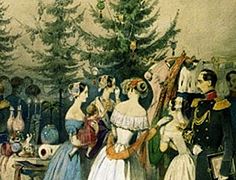Igumen Pachomy (Bruskov) offers here some insightful and straight-forward words on focusing on the true joy of the feast of the Nativity of Christ, not allowing it to be crowded out by worldly celebrations. While his words are specifically addressed to Russians, the spirit with which he speaks and the basic principles he puts forth are applicable to all.—Trans.
Do not think that New Year’s1 is some autonomous feast that appeared as a tradition in Soviet society all by itself, out of nowhere. The tradition of meeting the New Year was forcibly transformed out of the celebration of the Russians’ beloved Nativity of Christ. When Christianity was the religion of Russian society, all of these joys—a festive mood, faith in a better life, the expectation of gifts—were for every person connected precisely with Nativity.
Gifts were given on this day, recalling the gifts of the Magi, festive meals were arranged for the end of the fast and the arrival of Yuletide, people would visit one another, and carols were sung, glorifying the Savior, born into the world. As not only the Church, but the whole of society lived then according to the Julian calendar, New Year’s fell during Yuletide, and no contradiction arose.
After October 1917, all religious feasts, including Nativity, were banned. There could be punishment not just for going to church, but even for having an inoffensive Christmas tree at home. Only at the end of the 1930s did the government allow its citizens to celebrate holidays, but now it was on New Year’s night, which on the new, Gregorian calendar precedes Nativity and falls during the Nativity Fast. From the point of view of common sense, this tradition was completely artificial—you could equally well celebrate the beginning of the month or the beginning of the week. But during the years of Soviet authority, the people, far from the Church, got accustomed to this holiday. For believers (they existed during Soviet times), the Nativity of Christ remained the main holiday.
Of course, nearly every one of today’s churched people coming from a Soviet childhood are also used to New Year’s. But, coming to God, taking on for themselves the traditions by which the Church has lived throughout the centuries, not a single believer—adult or child—would exchange the Nativity of Christ for New Year’s. But Christians do not deny that someone can have a break from work and have a good time on New Year’s night.
The Church does not force anyone to celebrate or not celebrate, to fast or not to fast. Why does such resentment arise in secular people, when it seems to them that the Church robs them of New Year’s, offering instead Nativity? Because many people don’t even try to understand the essence of the Nativity of Christ. They think the feast, and the feeling of the fullness of life can only be connected with the chiming of the clock, special salads, and the spray of a champagne bottle. But why don’t people spending half of December running around to all the stores and buying groceries experience true joy? The chiming of the clock, the champagne cork… but a headache in the morning, an empty heart, and nothing special happened? Indeed, because New Year’s has no root, no deep truth. The proof of this is the great number of spirits (and not only champagne) that are drunk in our country during the holidays. After all, when there is true joy, you don’t need to artificially create it.
But there is this truth and depth and joy in the Nativity of Christ. Thus, perhaps it is worth it to try to leave Soviet prejudices and to partake of the true tradition of our people, accepting New Year’s as a quiet family holiday, as preparation for the Nativity? Or, at least, stop looking incredulously upon those who have already found this tradition for themselves.
As for horoscopes… We already find in the Old Testament a ban on turning to fortune-tellers and soothsayers. In such a way, man tries to learn the will of God for himself, his future, just out of empty curiosity, without any labor to cleanse his soul. Astrology is bad because man tries to build his life, including vices, with the help of these diagrams. In our days, adults seriously declare, “Well, what are you going to do? I’m a fire pig!”2 thereby justifying yet another improper deed.
In one of the books of the Old Testament, we find a story about how the Jews began to worship the sun, the stars, and the moon; that is, they were engaged in astrology, and they served idols—casting images of bulls—and such actions are repeatedly called an “abomination before God,” a betrayal, and insanity in the Sacred Scriptures, because the people were thereby turned away from God, their Creator. And the Lord turned away from them.
Of course, any betrayal, and any sin or vice can be explained with an unserious attitude. But when the first Christians were ordered to make sacrifices to pagan gods, their contemporaries also did not always demand a serious attitude. The Christians only had to throw a fistful of incense and confess the idols as gods—without heart, without faith, just out of a feeling of political correctness. But they were ready to go to death rather than to betray Christ. It is said in the Gospel, He that is faithful in that which is least is faithful also in much: and he that is unjust in the least is unjust also in much (Lk. 16:10). Man, able to violate the commandments in the little things, violates them in the big things.
Do not think that a breadth of views and a readiness to accept any beliefs and customs enriches our relationships with people. It is strange to rejoice that now you don’t have to rack your brains over what to give someone as a gift. Not all that long ago, not only children, but adults chose presents for those dear to them with pleasure and special care. They were often handmade, to express their care and love. But today we go to a store and buy some card with a poorly-rhymed poem, and some completely unnecessary souvenir—a symbol of the year, and then we head off to “delight” our loved ones. But our loved ones are then scratching their heads, wondering what to do with the whole herd of cows or horses, or the swarm of snakes3 that have accumulated from their caring relatives. And is giving gifts considered a nice custom? The only winners here are the sellers of these truly useless things.
Why are we so avid for all things foreign? From the West comes to us the unknown day of St. Valentine, and we forget our holy ascetics. For the Chinese, the year of the blue monkey is coming,4 and Russian people again store up nothing but Chinese folk traditions. No matter who you ask, few have read the Gospel, but everyone has read horoscopes. We’re ready to adopt every holiday from the West and East, decorate our apartments with images of pigs and rats, but when it comes to serious matters, to Christian traditions, we won’t lift a finger to discover something new. Even children have been learning about the day of lovers for some five-ten years in kindergarten, but over the past twenty years since the liberation of the Church, the Nativity of Christ has, alas, still not become near and dear to us.
This is our great tragedy. It is a betrayal of our traditions and ancestors, and, in the end, of ourselves. Europeans, like other peoples, are proud of their holidays and foundations, and cherish them. Why are we willing to forget and erase everything? What kind of revival of the Russian nation can we talk about then?




